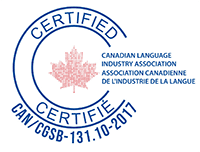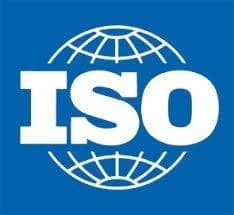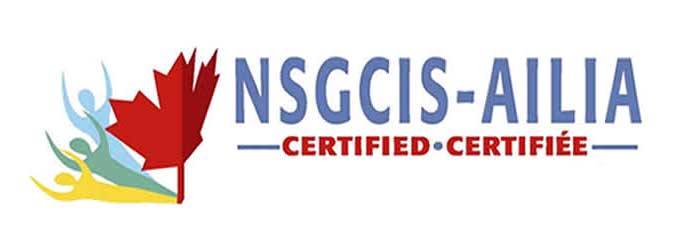Industry certified language services

Canadian General Standards Board CAN/CGSB-131.10-2017
Developed under the auspices of the Canadian General Standards Board and approved by the Standards Council of Canada, this certification establishes and defines the process requirements for the provision and translation services. It harmonizes, where possible, with the provisions of EN-15038 and was highly advocated for by the Canadian Language Industry Association (CLIA, formerly AILIA).

ISO 17100:2015 Standard for Translation Services
ISO 17100:2015 is the new international standard for translation services, provides requirements for the core processes, resources, and other aspects necessary for the delivery of a quality translation service that meets applicable specifications.
This standard encompasses the core translation process and all other related aspects involved in providing the service, including quality assurance and traceability. This standard offers both translation service providers and their clients a description and definition of the entire service.

ISO 18587:2017 Post-editing of Machine Translation Output
ISO 18587:2017 provides requirements for the process of full, human post-editing of machine translation output and post-editors’ competences. The organization has undergone a comprehensive audit and meets the requirements of the standard noted above according the Language Sector Certification Scheme.

National Standard Guide for Community Interpreting Services
The objective of the National Standard Guide for Community Interpreting Services (NSGCIS) is to set ISP delivery standards. This certification follows the Canadian standard such that NSGCIS-AILIA certified interpreters have one or all of the following qualifications: post-secondary education, preferably a recognized degree in interpretation or a related field; the completion of a language proficiency test; and documented experience in the field.

ISO 18841:2018 Interpreting Services – General requirements and recommendations
ISO 18841:2018 establishes general service requirements to ensure the quality of interpreting services. It outlines requirements and recommendations for delivering both spoken and signed communication across different languages and societal contexts. Additionally, it addresses the needs of various interpreting specializations to support consistent and reliable service delivery.

ISO 23155:2022 Conference Interpreting
ISO 23155:2022 establishes industry standards for conference interpreting, outlining requirements and recommendations for both interpreters and conference interpreting service providers. It highlights the demanding nature of conference interpreting, requiring interpreters to meet rigorous competence and qualification criteria. The standard also addresses the concept of cognitive load, emphasizing the mental effort involved, and underscores the importance of unobstructed visual and oral communication, as well as effective teamwork among interpreters.

ISO 20228:2019 Legal Interpreting
The ISO 20228:2019 standard establishes the principles and practices for legal interpreting services, outlining the competencies and qualifications required of legal interpreters. Its purpose is to ensure high-quality interpreting in legal settings, promoting equal access to justice by facilitating communication for individuals with limited proficiency in the language of legal proceedings. The standard also provides recommendations for interpreting modes, working conditions, and ethical adherence while addressing the responsibilities of all parties involved in the facilitation of legal interpreting services.

ISO 21998:2020 Medical Interpreting
The ISO 21998:2020 standard establishes requirements and recommendations for healthcare interpreting services in spoken and signed communication. Its purpose is to ensure accurate and safe communication between healthcare providers, patients, and healthcare staff, guaranteeing linguistic access to healthcare services. The standard aims to promote patient safety, set professional benchmarks for healthcare interpreters, and provide guidance for interpreting service providers to deliver high-quality interpreting in healthcare settings.



